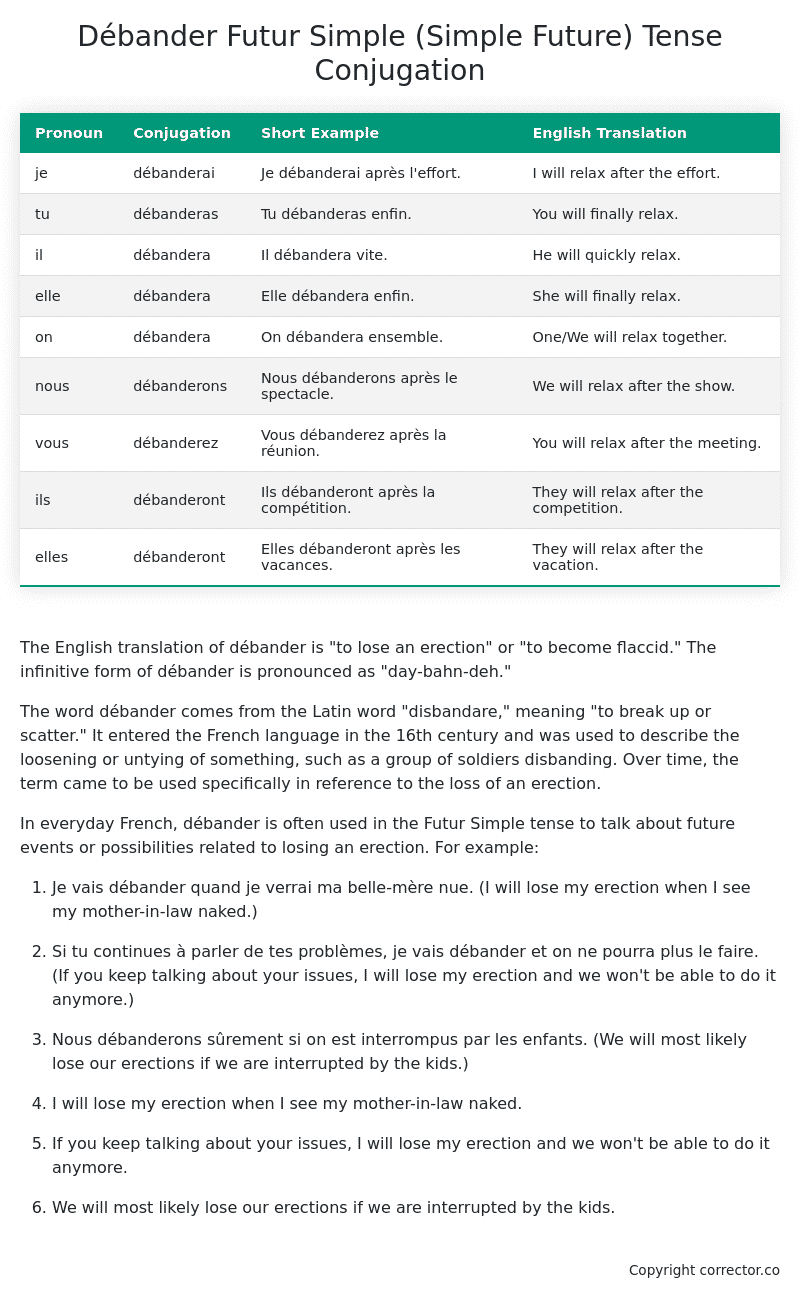Futur Simple (Simple Future) Tense Conjugation of the French Verb débander
Introduction to the verb débander
The English translation of débander is “to lose an erection” or “to become flaccid.” The infinitive form of débander is pronounced as “day-bahn-deh.”
The word débander comes from the Latin word “disbandare,” meaning “to break up or scatter.” It entered the French language in the 16th century and was used to describe the loosening or untying of something, such as a group of soldiers disbanding. Over time, the term came to be used specifically in reference to the loss of an erection.
In everyday French, débander is often used in the Futur Simple tense to talk about future events or possibilities related to losing an erection. For example:
-
Je vais débander quand je verrai ma belle-mère nue. (I will lose my erection when I see my mother-in-law naked.)
-
Si tu continues à parler de tes problèmes, je vais débander et on ne pourra plus le faire. (If you keep talking about your issues, I will lose my erection and we won’t be able to do it anymore.)
-
Nous débanderons sûrement si on est interrompus par les enfants. (We will most likely lose our erections if we are interrupted by the kids.)
-
I will lose my erection when I see my mother-in-law naked.
-
If you keep talking about your issues, I will lose my erection and we won’t be able to do it anymore.
-
We will most likely lose our erections if we are interrupted by the kids.
Table of the Futur Simple (Simple Future) Tense Conjugation of débander
| Pronoun | Conjugation | Short Example | English Translation |
|---|---|---|---|
| je | débanderai | Je débanderai après l’effort. | I will relax after the effort. |
| tu | débanderas | Tu débanderas enfin. | You will finally relax. |
| il | débandera | Il débandera vite. | He will quickly relax. |
| elle | débandera | Elle débandera enfin. | She will finally relax. |
| on | débandera | On débandera ensemble. | One/We will relax together. |
| nous | débanderons | Nous débanderons après le spectacle. | We will relax after the show. |
| vous | débanderez | Vous débanderez après la réunion. | You will relax after the meeting. |
| ils | débanderont | Ils débanderont après la compétition. | They will relax after the competition. |
| elles | débanderont | Elles débanderont après les vacances. | They will relax after the vacation. |
Other Conjugations for Débander.
Le Present (Present Tense) Conjugation of the French Verb débander
Imparfait (Imperfect) Tense Conjugation of the French Verb débander
Passé Simple (Simple Past) Tense Conjugation of the French Verb débander
Passé Composé (Present Perfect) Tense Conjugation of the French Verb débander
Futur Simple (Simple Future) Tense Conjugation of the French Verb débander (this article)
Futur Proche (Near Future) Tense Conjugation of the French Verb débander
Plus-que-parfait (Pluperfect) Tense Conjugation of the French Verb débander
Passé Antérieur (Past Anterior) Tense Conjugation of the French Verb débander
Futur Antérieur (Future Anterior) Tense Conjugation of the French Verb débander
Subjonctif Présent (Subjunctive Present) Tense Conjugation of the French Verb débander
Subjonctif Passé (Subjunctive Past) Tense Conjugation of the French Verb débander
Subjonctif Imparfait (Subjunctive Imperfect) Tense Conjugation of the French Verb débander
Subjonctif Plus-que-parfait (Subjunctive Pluperfect) Tense Conjugation of the French Verb débander
Conditionnel Présent (Conditional Present) Tense Conjugation of the French Verb débander
Conditionnel Passé (Conditional Past) Tense Conjugation of the French Verb débander
L’impératif Présent (Imperative Present) Tense Conjugation of the French Verb débander
L’infinitif Présent (Infinitive Present) Tense Conjugation of the French Verb débander
Struggling with French verbs or the language in general? Why not use our free French Grammar Checker – no registration required!
Get a FREE Download Study Sheet of this Conjugation 🔥
Simply right click the image below, click “save image” and get your free reference for the débander Futur Simple tense conjugation!

Débander – About the French Futur Simple (Simple Future) Tense
Formation of Futur Simple
For regular -er verbs (e.g., parler – to speak)
For regular -ir verbs (e.g., finir – to finish)
For regular -re verbs (e.g., vendre – to sell)
Common Everyday Usage Patterns
Conditional Statements
Interactions with Other Tenses
Futur Antérieur
Conditional
Present
Summary
I hope you enjoyed this article on the verb débander. Still in a learning mood? Check out another TOTALLY random French verb conjugation!


